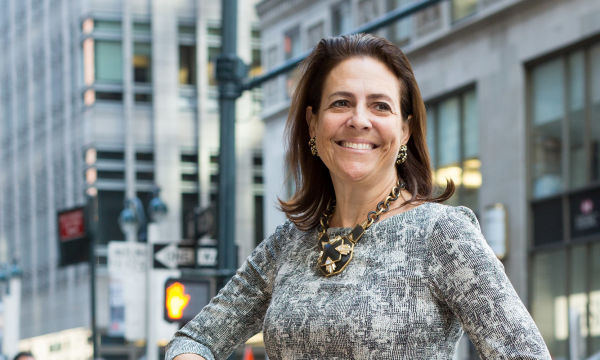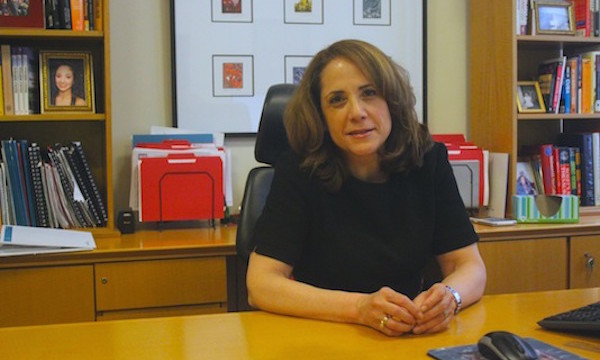Kristy Wallace, the CEO of Ellevate, on Building a Network and Taking a ‘Confidence Pill’
January 04, 2018 | Filed in: Woman of the Week
As the CEO of Ellevate Network, a global community dedicated to closing the gender achievement gap in business, Kristy Wallace is the first to admit that her life can get “a bit high stress.” She’s also a member of the United Nations Women Global Innovation Coalition for Change, co-chair of the Leadership Advisory Board for the Girl Scouts of Greater New York City, a mom of three—and the list goes on. Here, she talks about cutting corners, fostering relationships, and the importance of scheduling manicures into her calendar.
I OFTEN WISH I could give women a confidence pill. Remember: You have a lot to offer, you have tons of value, you have a unique perspective. Chances are, you have a skill or specific experience that not everyone in your network has, and many people would benefit greatly from your contributions. You may not see yourself as an expert, but your uniqueness makes you incredibly valuable.
I’M A BIG FAN of “fake it ’til you make it.” Sometimes I’m moving so fast that I can’t waste time second-guessing myself. It helps to accept that you are imperfect. For instance, as a new mom, I would stay up at night stressing about how I was failing at parenting. Then I realized, “Well, I’m not going to be perfect at everything, but the things I care the most about, I’m going to be great at.” Am I making great homemade meals? No. But am I on the floor playing with my kids and really loving every minute of it? Yes. We have to give ourselves permission to pick and choose our priorities.
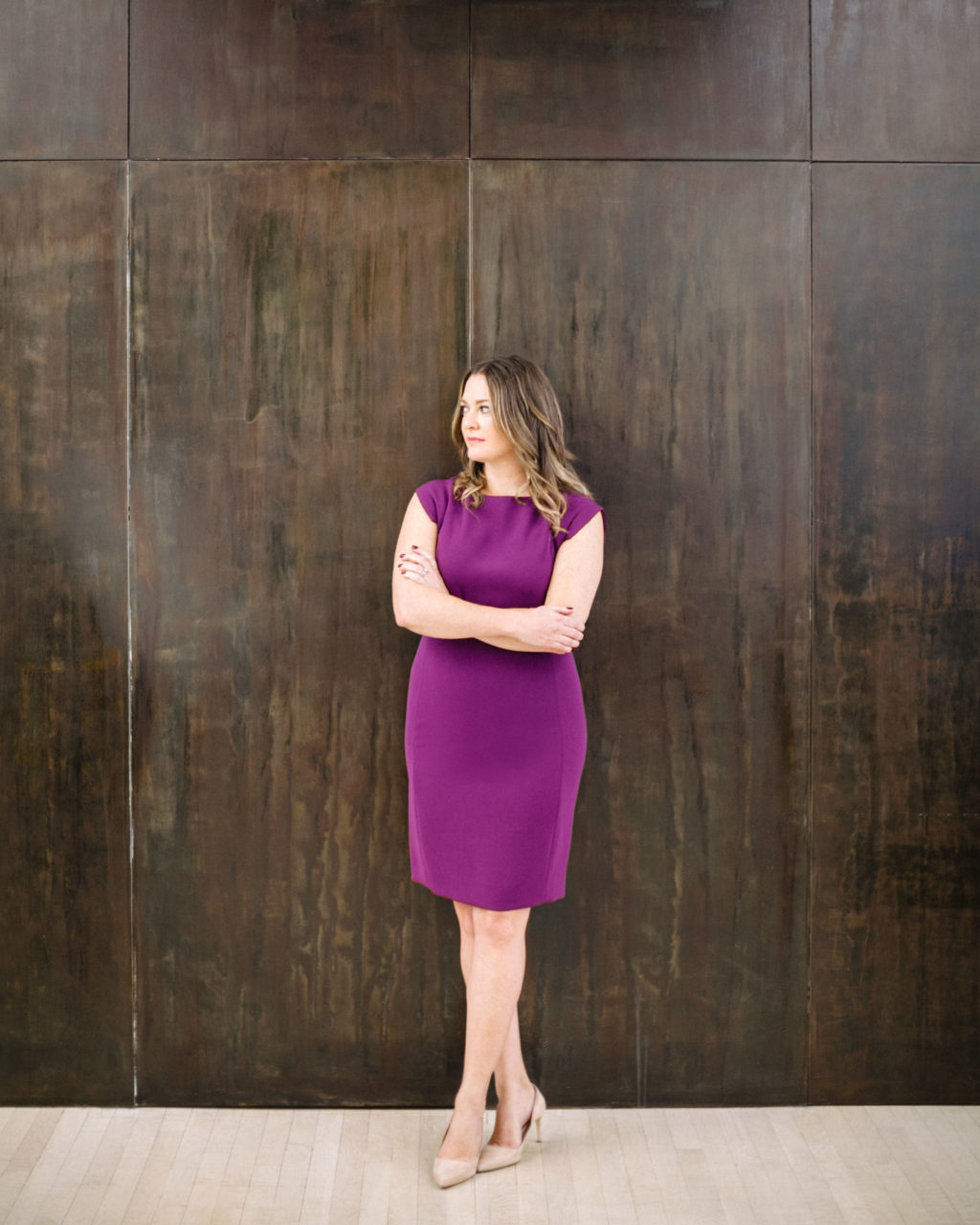
Kristy wears the Sarah 7.0 dress in deep plum and the Vanessa pump in beige.
WHEN I STARTED MY CAREER, my network consisted of my friends from college. Then, over time, some of those friends moved away, some left the workforce, some went into different industries, and our insights weren’t as relevant to each other anymore. That’s when I started to look for new networks with people who were more similarly situated. For example, when I had my first child, I felt totally lost. I connected online with a group of new parents in my neighborhood, and it turned out that there were 115 kids born in my Brooklyn community that same year—that’s a lot of parents! Having that network was helpful for everything: looking at schools, dealing with picky eaters or potty training, or just to say “I haven’t slept in days and I’m losing my mind.”
I HAVE MY SQUAD, or my personal board of advisors—the people I lean on for a gut check. My coworkers, my boss, my spouse, my friends—these are people I can ask, “Did I handle this situation appropriately?” Or, “Did I convey enough authority in this meeting?” I know they’ll give me honest feedback that I can use to move forward and improve. No one handles every single conversation or meeting or situation perfectly, but the important thing is to do better next time.
FOSTERING RELATIONSHIPS AND KEEPING IN TOUCH can be incredibly hard. Throughout the course of work and life, when you see articles or hear information that’s relevant to someone, I think it’s always a good idea to shoot them a quick note: “Hey, I saw this funny thing and it made me think of you,” or, “Saw your company’s ad on the subway,” or whatever. I also make a point of trying to schedule coffee or lunch or drinks with the people in my network that I really value. It doesn’t have to be every month; it could be once a quarter or twice a year. But I keep a list of those people and I’m intentional about reaching out to them on a regular basis for in-person meet-ups.

Kristy wears the Woolf 2.0 jardigan in taupe pearl, the Didion 3.0 top in black, the Pigalle 2.0 trouser in black, the Vanessa pump in black, and the Selldorf necklace in yellow gold.
I DO GET QUITE A FEW CALLS from people I don’t know well, or don’t know at all, saying, “Can I pick your brain about something?” It’s tough, because those meetings take time, and I have a lot on my plate. I prefer when people are direct. “Picking your brain” is so vague. What do you want? Provide as much context as possible, be explicit about how much time it’s going to take—10 minutes, 15 minutes—and your chances of getting in the door go way up.
MY FIRST JOB OUT OF COLLEGE was in finance, but I left to go to a startup. I worked at startups for about 15 years, and then I got to the point where I was looking for a new phase in my career—wanting more meaning and purpose. I spent a couple of years talking to different people and just doing informational interviews. I did my research and found people who had career paths or experiences that I was interested in. When I reached out, I had done my homework and knew exactly which questions I wanted to ask. I would say, “I’m trying to get to my next career stage, and I’m interested in your experience with X. If you have 10 minutes to talk to me about it, I’d appreciate it.” Ultimately, all of those micro conversations led to a macro decision. It was like I was gathering all these data points that guided me towards where I ultimately ended up, which was Ellevate.
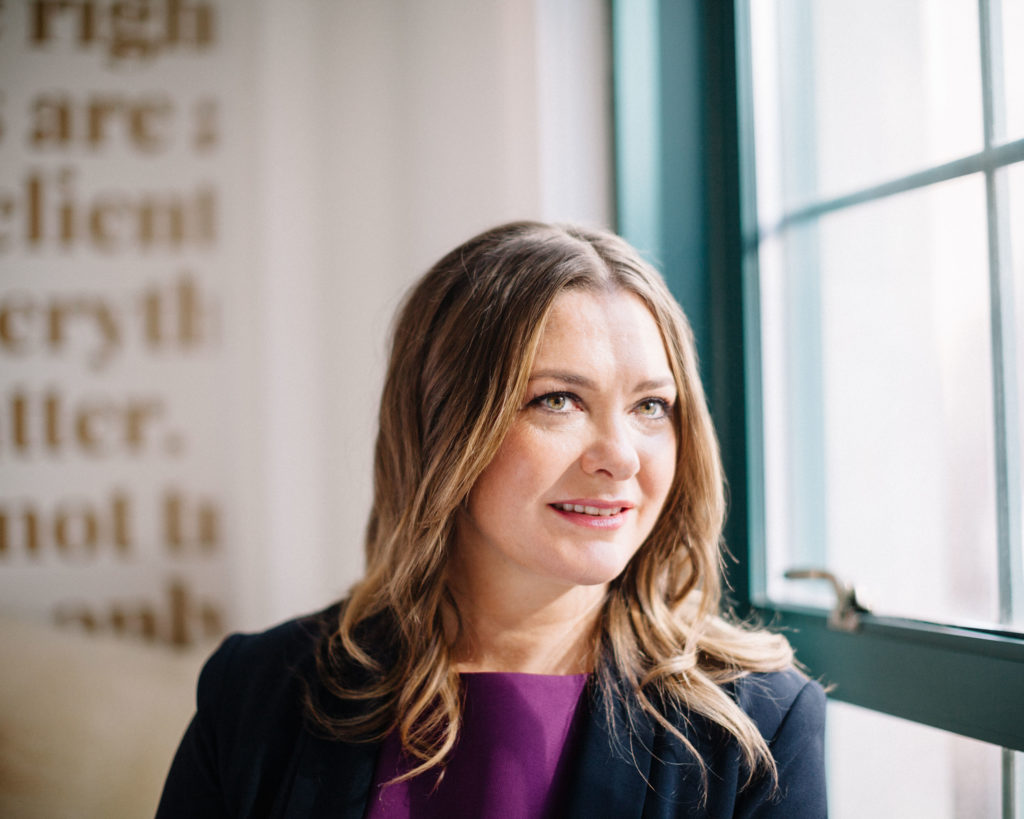
Kristy wears the Sarah 7.0 dress in deep plum with the Dietrich jacket in night sky.
WHEN I WAS GROWING UP, my parents called me Leona Helmsley because I was hard-headed and knew what I wanted. Whatever I did, I did it 100%. Now, in addition to being the CEO of Ellevate Network, I’m an angel investor in several women-led social enterprises and an advisor to the U.N. Women Global Innovation Coalition. I sit on a couple of nonprofit boards. In a way, these activities are like my hobby; some people spend five hours a week at the gym, or doing artwork, and this is what I spend my time on. Sure, I aspire to have more traditional hobbies, too, but the reality is I spend my time doing my day job, being with my family, and doing other work that is meaningful to me.
THERE’S NOTHING WRONG WITH CUTTING CORNERS when you can. I use FreshDirect, and order the exact same things every week, so grocery shopping takes me about 30 seconds. It’s not creative, but there’s food on the table, and I get it done fast. I also outsource my laundry. By finding little ways to save time every week, I can put more energy into my family and other activities that I find more fulfilling. I live and die by my calendar, and I schedule specific time slots for everything, even getting my nails done, which is my “thing.” It’s at least an hour every two weeks that I spend just doing something for myself, and I know when it’s happening, so I can look forward to it. I’m also public about my to-dos. As a company, we have a stand-up meeting every Monday, where each person states, “These are the things I’m going to accomplish this week.” That way, you’re not just holding yourself accountable; you have a team of people there to support you as well.
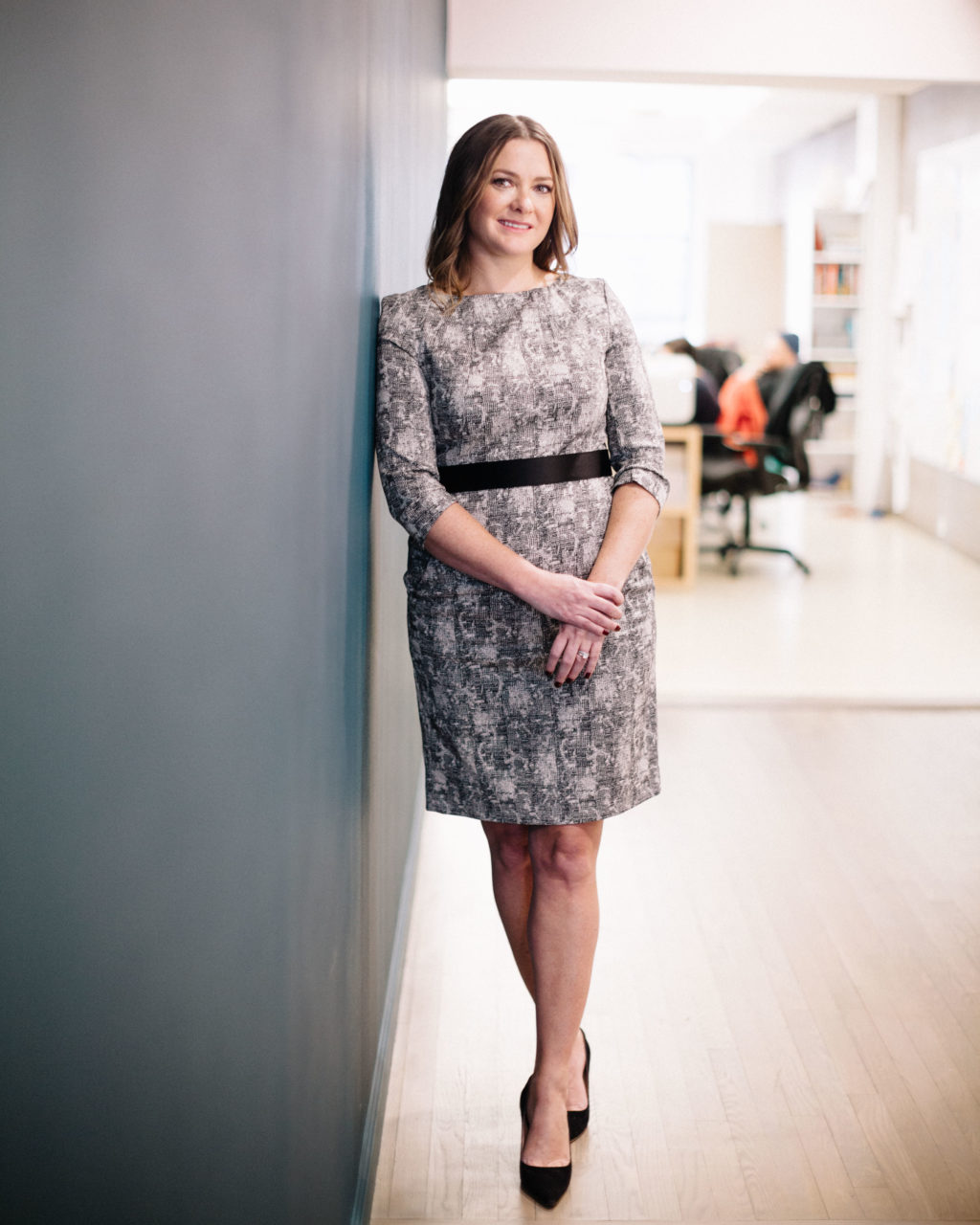
Kristy wears the Etsuko dress in crackle with the Matte Satin belt and Vanessa pump in black.
IT’S IMPORTANT TO BE AWARE OF YOUR MISTAKES, learn from them, and then quickly move past them. I can’t tell you how many hours I’ve spent regretting something I said or did, or didn’t do—not going for a promotion at a previous job, or flubbing a big presentation. But if you get too mired in what could or should have been, then you’re not focused enough on what will be, and where you’re going. You will probably make mistakes there, too, but it’s okay. It’s so easy to focus on things that go wrong, or times we feel like we didn’t get what we deserved. I can’t stress enough the importance of letting things go.
ONCE EVERY THREE TO SIX MONTHS, I make an effort to do some self-reflection. I ask myself, “Am I the person I want to be? Mentally, am I in a good place? Physically, am I in a good place? Professionally, personally, as a mother, as a friend, as a daughter, as a sister, how am I doing? Is this what I want? Am I finding satisfaction?” Then I start to identify what needs to change, and maybe make some small adjustments. One recent example was that I wasn’t sleeping well. I decided to try meditation, and it’s helped me in other parts of my life as well. Everyone has ups and downs, but it’s easy to let days and weeks and months pass, just going with the flow. If you don’t stop to reflect, then things can slide off track. I’m visual, so I always write things down—a list of what’s working, and what’s not working. And of the things that are working—why are they working? It’s important to document the good stuff, too.

Kristy wears the Sarah 7.0 dress in deep plum and the Dietrich jacket in night sky with the Vanessa pump in beige.
Like Kristy’s looks? Shop these and other classics here.
Photos by Rich Gilligan








